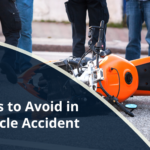Millions of individuals rely on public transportation, such as buses and the metro, to get where they need or wish to go. However, what happens if you fall and sustain an injury on a bus? Slips, trips, falls, electric shocks and smoke incidents accounted for 48% of all bus-related injuries, as reported by the United States Department of Transportation. These incidents were also responsible for 7% of all bus fatalities between 2008 and 2016, and their frequency per mile has increased for six consecutive years.
You may wonder if you can sue the government if you slip and fall while using public transportation. Ultimately, your state, municipality, or county operates public transit. Could you file a lawsuit on behalf of a family member who died after slipping and falling on a bus? Yes is the answer to both questions. Understanding your legal options is crucial if you want to obtain the best possible outcome in a case involving a bus accident.
Common Slip and Fall Injuries on Buses
A slip or fall is no laughing matter. Age increases the likelihood that a fall will result in broken bones. A bus fall can result in spinal or nerve damage, neck injuries, cuts, bruises, muscle strains or tears, knee injuries, dislocated shoulders, hip injuries, and sprained wrists and ankles.
The interiors of buses are filled with sharp angles, such as the seats and handrails. If you slip or fall on your descent, you may collide with multiple surfaces. A blow to the head may result in a concussion or traumatic brain injury. Even catching yourself could backfire, as you could injure the arm or shoulder you used to stop your fall.
It is not difficult to understand why there are so many slip and fall accidents on buses. Passengers are frequently packed together, making it easy for someone to lose their balance and fall if another passenger bumps them. Luggage and other accessories can clutter the floor and exacerbate falls. Due to precipitation, snow, or beverage spills, the wet, slick floors of many buses worsen the severity of slip-and-fall incidents.
Also contributing to the risk of slipping and falling are bus doors that do not open or close properly, loose carpeting, broken handrails, and aggressive bus drivers. A driver who speeds or takes corners too quickly may cause passengers to fall out of the vehicle.
How Filing a Lawsuit Can Help After a Bus Accident?
Filing a lawsuit for a slip-and-fall accident can help you recover economic and noneconomic damages. This involves:
- The cost of your injuries medical treatment and long-term care.
- Any income or wages you lost due to your inability to work.
- Your physical suffering, emotional agony, and mental anguish.
- Any property loss you incurred, for example, a laptop that broke when you fell.
You shouldn’t be on the hook for injuries caused by someone else. The more severe or permanent your injuries, the more compensation you could get.
Conclusion
At 2H Law Firm, your consultation is free, and our attorneys work on a contingency fee basis. That means you don’t pay unless we win your case. If a government entity is involved in your injury, you may only have 60 days to file a claim. It’s important to talk to a public bus accident lawyer as soon as possible. Contact us online or via phone at (619)-374-9320 to work with a team dedicated to fighting for your rights.









